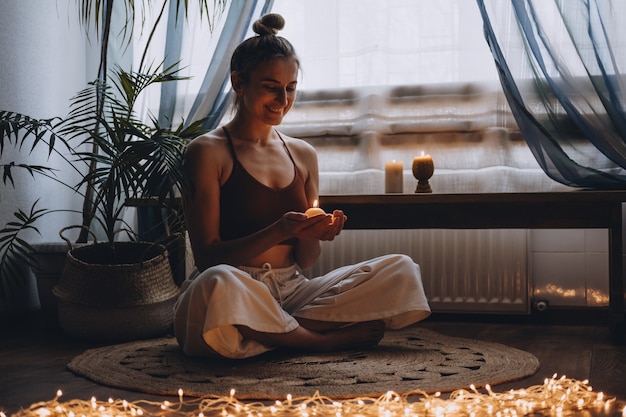Aromatherapy: 7 Essential Oils for Relaxation & Well-being

Explore the World of Aromatherapy: 7 Essential Oils for Relaxation and Well-being delves into the therapeutic benefits of essential oils, highlighting how these natural extracts can promote relaxation, reduce stress, and enhance overall well-being through various application methods and specific oil properties.
Welcome to the serene world of aromatherapy, where the fragrant essences of plants are harnessed to promote relaxation and well-being. This exploration will guide you through the therapeutic benefits of seven essential oils. Explore the World of Aromatherapy: 7 Essential Oils for Relaxation and Well-being focuses on how these oils can be integrated into your daily life to foster a sense of calm and enhance your overall health.
Unveiling the Power of Aromatherapy
Aromatherapy is more than just a pleasant scent; it’s a holistic healing practice that uses natural plant extracts to promote health and well-being. By stimulating the olfactory system, essential oils can trigger emotional and physiological responses in the brain and body, leading to relaxation and improved mood.
Understanding the principles of aromatherapy and the unique properties of different essential oils is key to unlocking its full potential. Let’s dive deeper into how aromatherapy works.
The Science Behind Scent
The olfactory system has a direct connection to the limbic system, the part of the brain responsible for emotions, memories, and hormone regulation. This direct pathway explains why certain scents can evoke powerful emotional responses. Essential oils, when inhaled, stimulate these areas, promoting relaxation, reducing stress, and even improving cognitive function.
Methods of Application
There are various ways to incorporate essential oils into your life. Diffusion is a popular method, dispersing the oil’s aroma into the air. Topical application, when diluted with a carrier oil, allows for direct absorption through the skin. Other methods include inhalation, compresses, and aromatic baths.
- Diffusion: Using an ultrasonic or nebulizing diffuser to disperse essential oils into the air.
- Topical Application: Diluting essential oils with a carrier oil and applying them to the skin.
- Inhalation: Direct inhalation from a bottle or using a steam inhalation method.
- Aromatic Baths: Adding a few drops of essential oil to a warm bath.
In conclusion, aromatherapy works by harnessing the potent scents of essential oils to trigger beneficial changes in the brain and body. Whether through diffusion, topical application, or inhalation, the possibilities are vast.
Lavender: The Queen of Calm
Lavender is perhaps the most well-known essential oil, celebrated for its calming and sleep-inducing properties. Its floral, slightly sweet aroma is widely used to alleviate stress, anxiety, and insomnia. Lavender is a versatile oil that can be used in many ways to enhance relaxation.
Let’s explore how using lavender can significantly improve your well-being.

Benefits of Lavender Oil
Lavender offers a wide range of benefits, from promoting relaxation to relieving pain. It has been shown to reduce anxiety symptoms, improve sleep quality, and even alleviate headaches. Its anti-inflammatory properties also make it a useful remedy for skin irritations and minor burns.
How to Use Lavender Oil
Lavender can be diffused in your bedroom to create a relaxing atmosphere before sleep. It can also be applied topically, diluted with a carrier oil like jojoba or almond oil, to pulse points such as wrists and temples. Adding a few drops to a warm bath can also help ease tension and promote a restful night’s sleep.
- Diffusing to promote relaxation and improve sleep.
- Topical application (diluted) to pulse points to reduce anxiety.
- Adding to a warm bath to ease tension.
- Using in a massage oil to relax muscles.
In summary, lavender is a versatile and effective essential oil for promoting calm and well-being. Its diverse benefits and easy application make it a staple in any aromatherapy collection.
Chamomile: Gentle Soother
Chamomile, known for its gentle and calming properties, is an excellent choice for relieving stress and promoting relaxation. Its sweet, apple-like aroma helps to soothe the mind and body, making it a popular remedy for anxiety and insomnia.
Discover how incorporating chamomile essential oil into your routine can cultivate a sense of tranquility.
Uses of Chamomile Oil
Chamomile is often used to alleviate symptoms anxiety and stress. It can be effectively diffused into the air to crate a calming atmosphere in the home. It can also be used topically when diluted to relive sore muscles or skin irritations. Many people find it helpful to take chamomile before bed to assist in sleep
Chamomile for Sleep
Chamomile is particularly effective at treating sleep problems. Its sedative properties, which are linked to the presence of apigenin, help with calming the sensory system and lowering anxiety. It can boost the quality of sleep by relieving restlessness and promoting a restful sleep.
- Diffuse to improve sleep quality.
- Apply topically to reduce muscle tension.
- Add to bath water for ultimate relaxation.
To conclude, chamomile essential oil is a great addition to any aromatherapy collection. It’s particularly useful for anyone wishing to soothe their body and enhance relaxation because of its many tranquilizing qualities.
Frankincense: The Ancient Healer
Frankincense, revered for its grounding and meditative properties, has been used for centuries in spiritual practices and traditional medicine. Its woody, resinous aroma is known to promote a sense of calm, reduce stress, and enhance mental clarity.
Explore the therapeutic benefits of frankincense and discover how it can enhance your spiritual and emotional well-being.
Benefits of Frankincense Oil
Frankincense boasts powerful anti-inflammatory and analgesic properties, making it a useful remedy for pain relief. In one study it was showed to significantly reduce pain due to Osteoarthritis. In addition, it also helps to improve focus and concentration. Known for its ability to deepen spiritual awareness, Frankincense is therefore perfect for meditation and yoga practices.
Integrating Frankincense into Your Routine
When meditating or doing yoga, diffuse frankincense to establish a calm environment and improve attention. Dilute it with a carrier oil and apply it topically to pulse points to improve focus and relieve tension during demanding jobs. Additionally, you can apply it to the skin to provide pain and reduce inflammation brought on by ailments like arthritis.
- Diffusing during meditation and yoga practices.
- Applying topically to pulse points to relieve stress.
- Using in skincare to reduce inflammation and promote healing.
In brief, frankincense is a potent essential oil with a wide array of advantages for mental and emotional health. Its ability to encourage focus and healing makes it a great addition to any holistic wellness program.
Peppermint: The Energizer
Peppermint, with its invigorating and refreshing aroma, is known for its ability to boost energy levels, improve focus, and relieve headaches. Its cooling properties can also help soothe digestive issues and muscle pain.
Discover how incorporating peppermint essential oil into your daily routine can revitalize your mind and body.

Uses of Peppermint Oil
One of the most well-known advantages of peppermint is that it can lessen tension headaches and migraines. Its activation of blood flow and relaxing effects on muscles provide respite from throbbing headaches when applied topically or inhaled. In addition, peppermint is an excellent decongestant that can ease breathing by clearing congested sinuses.
Peppermint for Focus and Energy
Peppermint oil is an effective tool to improve focus and concentration, whether you’re studying or working. By diffusing it, the oil stimulates your mind, which sharpens mental clarity and boosts productivity. The aromatherapy power from peppermint can get rid of mental weariness, which makes it easier to concentrate on tasks.
- Inhale to relieve headaches and improve focus.
- Apply topically (diluted) to soothe muscle pain.
- Diffuse to boost energy and concentration.
In conclusion, peppermint essential oil is a must-have for anyone trying to increase productivity and sharpen their mental capacities. It improves general well-being because of its refreshing aroma and numerous therapeutic qualities.
Eucalyptus: The Respiratory Relief
Eucalyptus, known for its strong, medicinal aroma, is widely used to support respiratory health. Its decongestant and anti-inflammatory properties can help clear sinuses, ease coughs, and promote easier breathing.
Let’s explore how eucalyptus essential oil can provide relief from respiratory discomfort and enhance your overall well-being.
Benefits of Eucalyptus Oil
Eucalyptus is frequently used to ease respiratory ailments. Its expectorant qualities aid in clearing mucus and phlegm from the airways, which makes breathing easier. Because to its anti-inflammatory qualities, it also helps to reduce edema and irritation in the nasal canals. Eucalyptus can be a particularly effective treatment for asthma, bronchitis, and colds because of its ability to strengthen the respiratory system.
Using Eucalyptus for Respiratory Health
Eucalyptus is a flexible instrument for maintaining respiratory health whether it is used in steam treatments, as an chest rub, or diffused. Add a few drops into a hot bath or bowl of boiling water for a steam treatment to clear nasal passages and reduce nasal swelling. You can apply an eucalyptus-containing chest rub on your chest for nighttime cough relief as well. For those wishing to promote clear breathing throughout the day, diffusing eucalyptus offers continuous respiratory support.
- Inhale through steam therapy to clear congestion.
- Apply topically to chest to assist with nighttime cough relief.
- Diffuse to support clear breathing.
In summary, the soothing and decongestive effects of eucalyptus essential oil make it a necessary part of any natural respiratory support system.
Lemon: The Mood Booster
Lemon, with its bright and citrusy aroma, is a powerful mood booster and energizer. Its refreshing scent is known to uplift the spirits, reduce stress, and enhance mental clarity. Lemon essential oil can also be used to cleanse and purify the air.
Discover how incorporating lemon essential oil into your daily life can uplift your mood and enhance your overall well-being.
Revitalizing lemon aroma
Lemon offers a wide range of benefits, from promoting relaxation to relieving pain. It has been shown to reduce anxiety symptoms, improve sleep quality, and even alleviate headaches. Its anti-inflammatory properties also make it a useful remedy for skin irritations and minor burns.
How to Use Lemon Oil
Lemon can be diffused in your office or living room to create an energizing atmosphere during the day. It can also be added to cleaning products for its antibacterial and deodorizing properties. Inhaling lemon essential oil can help improve focus and concentration, making it a great choice for work or study sessions.
- Diffusing to uplift mood and energize your mind.
- Adding to cleaning products for a fresh scent and antibacterial properties.
- Inhaling can improve focus and concentration.
In summary, Lemon is a versatile and effective essential oil for promoting a better mood and well-being. Its diverse benefits and easy application make it a staple in any aromatherapy collection.
| Key Point | Brief Description |
|---|---|
| 🌿 Aromatherapy | Holistic practice using natural plant extracts to promote well-being. |
| 😴 Lavender Oil | Calming and sleep-inducing; reduces stress and anxiety. |
| 🧘 Frankincense Oil | Grounding and meditative; enhances mental clarity and focus. |
| 🍋 Lemon Oil | Bright and citrusy; uplifts mood and boosts energy. |
Frequently Asked Questions
Aromatherapy is holistic practice using the natural extracts from plants to promote health and wellbeing. Essential oils stimulate the olfactory system, triggering emotional and physiological responses in the brain leading to better mood.
To use these oils safely, always dilute them with a carrier oil when applying topically; some oils can cause skin irritation. When diffusing, use a diffuser according to manufacturer guidelines. If you are pregnant, nursing, or have health issues, consult a healthcare professional.
Lavender oil is best when trying to improve sleep quality. It is know for being relaxing and can help promote a more restful nights’s sleep. Chamomile can also be useful in calming the mind and body to prepare for sleep.
Essential oils have calming properties that can help with stress and anxiety. These include lavender, chamomile, and frankincense. These oils have been shown to reduce stress and promote relaxation.
Several essential oils are very effective for boosting energy and increasing focus. Lemon and Peppermint have qualities that make it easier to feel more aware and focused. These oils can be diffused or inhaled for a rapid energy boost.
Conclusion
In conclusion, exploring the world of aromatherapy reveals a treasure trove of natural remedies that can enhance relaxation and overall well-being. Integrating these seven essential oils into your daily routine can create a more balanced and harmonious lifestyle. Whether you seek calm, energy, or respiratory relief, aromatherapy offers a gentle, effective path to wellness.